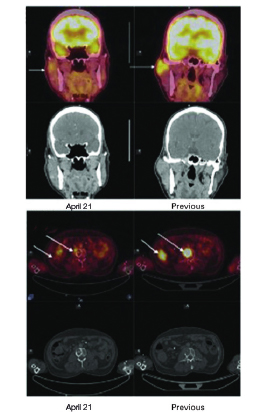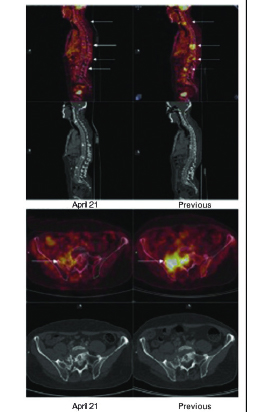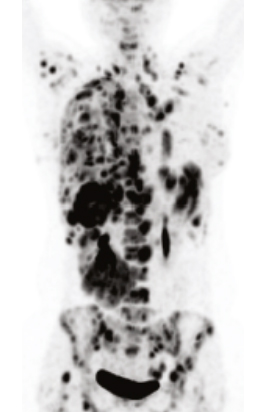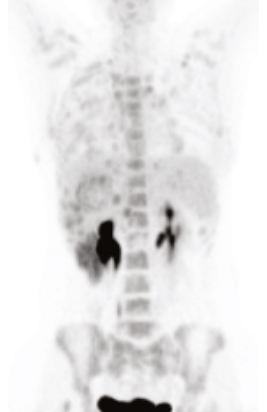The most comprehensive tumour investigation
exacta is a comprehensive analysis of molecular-genetic characteristics of solid tumours based on the results of several clinical studies. Especially for rare solid tumours where no guidelines are available, in the advanced situation or for tumours that are difficult to treat, exacta is providing an advantage. exacta analyses millions of data points at the molecular level to identify all relevant targets for an individual therapy.
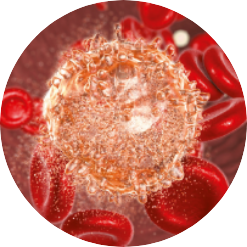
About exacta
However, conventional ‘Standard of Care’ approach does not take into consideration the overall genetic architecture of a particular patient‘s tumour. Consequently, patients could suffer due to failed therapies or aggressive relapse. It is, thus, imperative that the molecular architecture of the tumour is studied comprehensively before deciding the treatment plan, which has to be personalised to individual patients and their disease.
exacta is a comprehensive in depth tumour gene expression analysis. It analyses 100’s of millions of data points at the molecular level to reveal all possible targets for precision drugs.
exacta helps unravel driver mutations and pathways that are propelling a person’s cancer through multi-analyte and multi-coordinate analysis over 20.805 genes in the cancer genome. This analysis helps identify drugs that would be most effective for a particular solid tumour. exacta, thus enables a highly sophisticated treatment strategy beyond conventional perspective, even for difficult to treat or late stage cancers.
exacta is particularly recommended for cancer patients where ...
... first-line therapy has failed.
... cancer has relapsed.
... cancer is high-grade / metastatic.
... challenging cancers such as stomach, oesophagus, pancreas, gall bladder, GIST etc. have been newly diagnosed.
... risk of therapy failure is high.
Methodology
-
Targeted Genes
SNVs, CNVs, gene amplifications, mutational burden, germline mutations
-
Immunocytochemical markers
mTOR, VEGFR1, VEGFR2, EGFR, VEGFA
-
RNA Sequencing
KEGG pathways (disease-related, therapy-relevant and resistance patterns)
-
Pharmacogenetics
Genotyping for CYP450, transporter proteins or assessment of drug toxicity and efficacy
-
Chemosensitivity
Patented in vitro cell based assay on living cells
-
Liquid Biopsy
Mutation load, tumour heterogeneity
Advantages
Most Optimal Targeted Therapy Selection:
• exacta identifies possible molecular targets and cell cycle pathways to find the most appropriate molecular targets for targeted treatment.
• All relevant biomarkers for targeted therapy selection, including mutations, deletions, gene rearrangement, gene amplification / expression, are analysed.
Assessment of adverse drug reactions:
• Selection of therapy with least side effects based on pharmacogenomics.
Most Optimal Cytotoxic Therapy Selection:
• Cytotoxic drug response / resistance of cancer genome, based on DNA and gene expression.
• Comprehensive exacta includes chemosensitivity testing for cytotoxic drug efficacy prediction.
Comprehensive
-
Tumour DNA analysis511 genes (tissue biopsy) / 411 genes (liquid biopsy)
-
Mutations and gene amplifications
-
Fusion / rearrangements
51 genes (tissue biopsy) / 12 genes (liquid biopsy)
-
Tumour gene expression
20.805 genes
-
Cellular pathways as per KEGG
-
Chemosensitivity *
up to 60 drugs
-
Liquid biopsy cell free DNA (cfDNA)
-
ICC immunocytochemistry (mTOR, VEGFR, EGFR, etc.)
-
Microsatellite instability (MSI / MMR)
(tissue biopsy / liquid biopsy)
-
Tumour mutational burden (TMB)
-
Relevant IHC, PD-L1, AR etc.
(tissue biopsy)
-
Circulating tumor cells (CTCs)
-
Pharmacogenetic guidance
-
Immunotherapy guidance
-
Limit of detection (MAF)
0.1 % (cfTNA)
-
Sensitivity at 0.1 % MAF (cfTNA)
97.06 %
-
Positive Predictive Value
100 %
* Subject to availability of adequate sample.
100s of Millions of Data Points Analyzed
(from Peripheral Blood and / or Fresh Tissue and / or FFPE Block / or Liquor)
Cell Free DNA
Exosomal 20.805 mRNAs
Driver Mutations; Rearrangements; Insertions and Deletions from 511 / 409 genes
Direct Live Tumour Cell Assessment
Tumor Cell Cycle Pathways
Artificial Intelligence / Database based, multi-level iterative algorithm to determine optimum (most favorable + least toxic) drugs and drug combinations
Therapy Recommendations
Sample requirement

40 ml blood in STRECK and EDTA tubes
Optional: 40 ml blood in STRECK and EDTA tubes as well as fresh tissue sample in DCGL transport media (4-6cm3 or 5 cores); alternative: FFPE tissue block
Precautions:
Please wait 24 hours after chemotherapy/PET-CT/MRI, before sampling blood.
Please wait 10 days after blood transfusion.
Turn Around Time (TAT):
10 - 14 days from receipt of the sample
FAQ
Just as each patient is unique, so is each cancer. No two patients’ cancers are alike. Even two similar patients (e.g. age, gender, height, lifestyle) with the same type of cancer will have different molecular tumour profiles. Hence, each patient should perform an individual exacta test.
Cancer can be very aggressive and may evolve rapidly; the tumour profile can change dramatically over time. If there is a long enough delay the cancer may gain resistance to treatments and re-analysis may be required.
Only drugs that have been approved by the FDA will be recommended and be administered. These will include drugs that are FDA approved for use in same cancer / other cancer / other non-cancerous diseases.
Molecular tests like our cancertrack analysis allow the oncologist to monitor the therapy in real time. In addition, the test provides insights on genetic changes of the original tumour to adapt the therapy.



